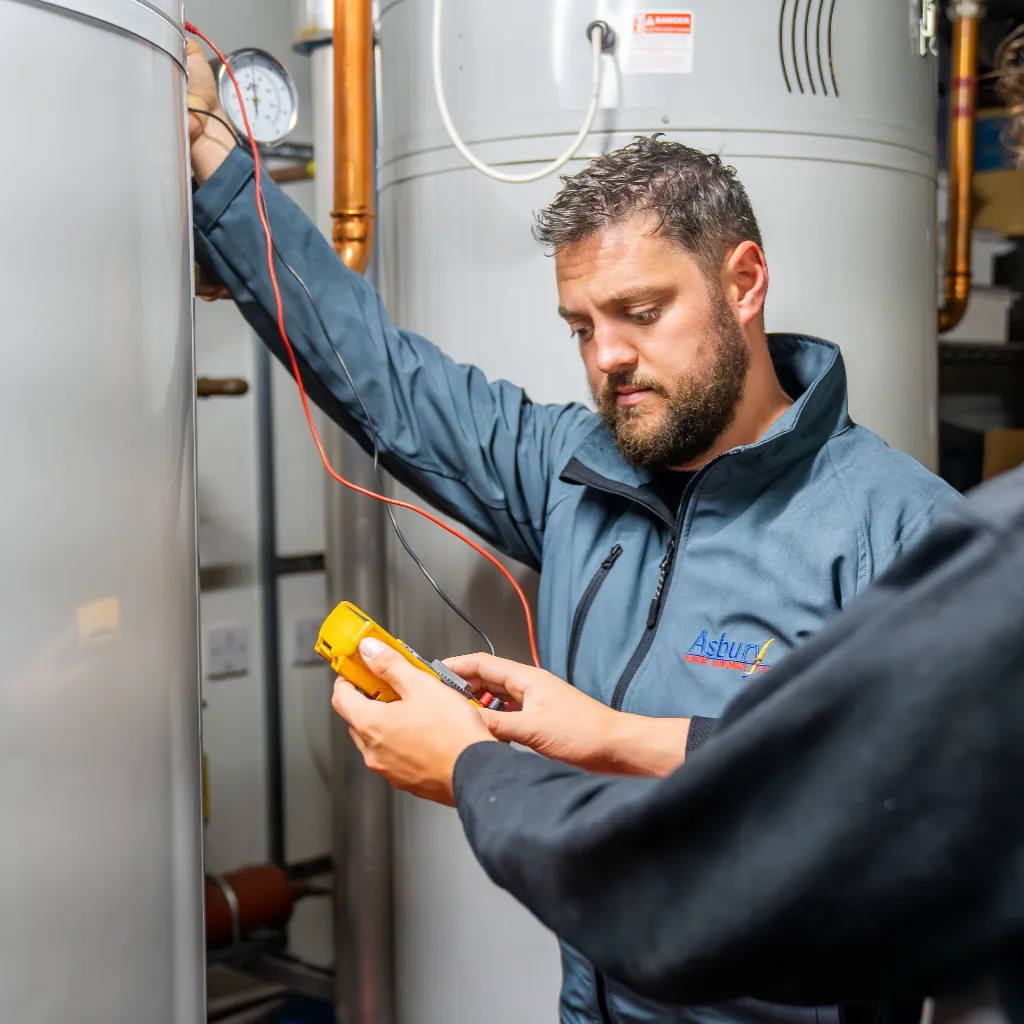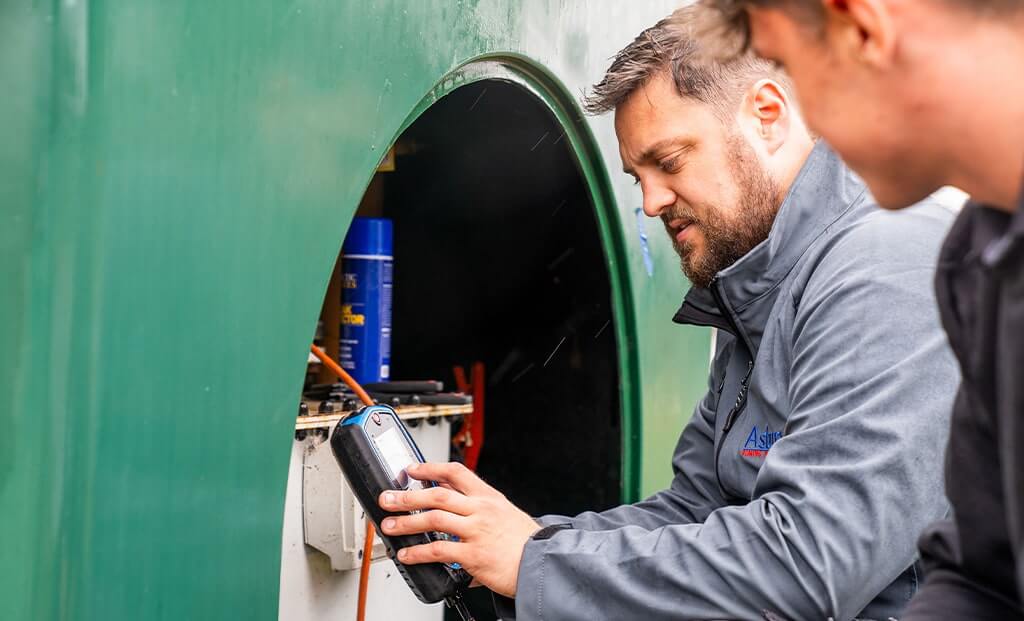
What is a Gas Tightness Test & Why Your Site Needs One
A gas tightness test is a vital procedure that ensures your commercial gas system remains safe, compliant, and leak-free. This test checks the integrity of your gas installations. It confirms whether the system can safely contain pressure and operate without risk of failure.
Any business using gas appliances, such as for heating, hot water, or cooking, needs to conduct regular gas tightness testing. It helps you follow UK regulations, prevent surprise repairs, and keep your property and its occupants safe.
In this post, we’ll cover what a gas tightness test is, why it’s vital for your property’s safety, and how it keeps your business compliant and efficient.

How a Gas Tightness Test Protects Your Property & People
A gas tightness test is a procedure conducted by a Gas Safe-registered engineer to ensure your gas system is secure and leak-free. The test involves inspecting your pipework and appliances. It verifies that the system can maintain the correct gas pressure safely.
Required by law, a gas-tightness test must be performed whenever gas systems are installed, modified, or repaired. It’s also included in yearly gas safety checks for businesses that use gas-powered equipment. This helps ensure you meet regulations.
The procedure involves pressurising the gas system and monitoring the pressure over time. If the pressure remains stable, the system is deemed safe. If the pressure drops, a leak or fault is detected, and the engineer will locate and address the issue. The Gas Safety (Installation and Use) Regulations 1998 say all commercial properties must be tested for gas tightness. This ensures your gas system is not only functional but also fully compliant with safety standards.
Why Your Site Needs a Gas Tightness Test
Regular gas tightness testing is crucial for your business. It not only meets UK gas safety regulations but also keeps your business, employees, and customers safe from serious risks. These tests spot leaks early, save you from costly downtime, and help you avoid big repairs. They also keep your gas systems safe and running well.
Here are some main points to remember:
- You must conduct regular gas tightness tests as required by the Gas Safety (Installation and Use) Regulations 1998. This ensures your system is safe and compliant, and failure to comply can result in legal consequences and costly fines.
- Gas leaks pose a significant risk of fire, explosions, and carbon monoxide poisoning. Testing helps detect issues before they escalate, protecting everyone on your premises.
- Leaks and faults can cause expensive repairs and unplanned downtime. As you can see from this hospital case study, routine testing spots problems early. This helps your business avoid high repair costs and keeps operations running smoothly.
By prioritising regular gas tightness tests, you lower risks, stay compliant with the law, and protect your business.


When Should You Conduct a Gas Tightness Test?
Regular gas tightness testing is essential but knowing when to conduct it is equally important. There are key moments throughout the year and your system’s lifecycle when a gas tightness test should be carried out. This not only ensures compliance but also helps to maintain a safe and efficient gas system.
After installing new gas appliances or making modifications to the gas system, a test must be performed. This confirms that all connections are secure and that the system can safely operate at the correct pressure levels. Similarly, any repairs made to the system should be followed by a gas tightness test to ensure that everything is in proper working order.
An annual gas safety check is legally required for commercial properties. This check must include a gas tightness test to ensure the system’s continued safety. Conducting regular tests during your annual check-ups helps prevent unexpected problems. It also keeps your business compliant with UK gas safety regulations.
Much like this pub in West Parley, if you suspect a gas leak, it’s essential to act quickly and arrange for a gas tightness test. Leaks can be hazardous, and even minor issues can lead to serious consequences if left undetected. Having a test performed as soon as possible helps identify the source of the leak, ensuring your system is safe to use again.
A Step-by-Step Guide to How We Conduct Gas Tightness Testing
A gas tightness test ensures that your gas system operates safely, leak-free, and in compliance with UK regulations. Here’s a breakdown of the process that a Gas Safe-registered engineer follows to test the integrity of your system.
1. Initial Safety Inspection
The test begins with a thorough visual inspection of the entire gas system. The engineer inspects the pipework and appliances. They ensure that emergency shut-off valves are easily visible and accessible. This step identifies any obvious faults before the test proceeds, making sure the system is safe to test.
2. Connecting the Manometer & Pressurising the System
To measure the system’s pressure, the engineer connects a manometer (a precision pressure gauge) to the gas meter. The system is then pressurised to the required level, sometimes using air if the system is being tested before gas is introduced. This pressurisation helps the engineer observe whether the system can keep pressure without any leaks.
3. Stabilisation & Monitoring
Once pressurised, the engineer allows the system to stabilise for a specified period. The pressure must remain steady throughout this time, indicating that the system is leak-free. If the pressure drops below the acceptable level, it signals a leak or fault in the system, which must be addressed before proceeding.
4. Identifying Leaks & Necessary Repairs
If the engineer sees a pressure drop, they check for leaks by inspecting joints, connections, and appliances. Once the leak’s source is identified, repairs are made, and the system is retested to ensure it is safe and compliant. This ensures that any faults are fully resolved before the system is put back into use.
5. Certification & Compliance
Once the test is done and any needed repairs are finished, the engineer will provide a gas safety certificate. This certificate proves your system has passed the test. It confirms that it is safe, leak-free, and fully meets UK gas safety regulations. The document is crucial for inspections and audits. It ensures confidence for your business and meets regulatory requirements.
Choose Asbury Heating for Reliable, Safe Gas Tightness Testing
Keeping your commercial gas system safe and compliant is crucial for any business. Regular gas tightness tests ensure we remain compliant with UK regulations. They also help avoid expensive repairs and safeguard employees, customers, and visitors. These tests are vital for maintaining operational efficiency and security.
At Asbury Heating, we have over 60 years of experience. Our Gas Safe-registered engineers carry out gas tightness testing expertly. We provide fast, flexible scheduling and round-the-clock emergency support. This ensures your system remains compliant, safe, and operates efficiently. Our services include complete compliance checks, and we provide a gas safety certificate for peace of mind.
Call 01202 745189 or arrange a consultation to ensure the safety and compliance of your property with Asbury Heating today.














